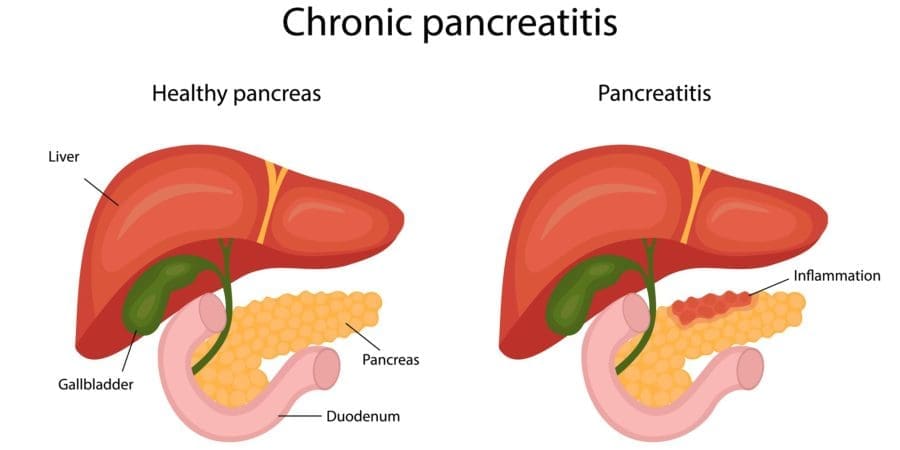Navigating the complex terrain of mental health and substance abuse can be overwhelming, especially when they co-occur. In this comprehensive guide, we delve deep into the topic of dual diagnosis, shedding light on the various mental health conditions often linked with substance abuse, and why specialized treatment is imperative.
Whether you or a loved one is grappling with these challenges, understanding dual diagnosis is the first crucial step towards a healthier life. If you find yourself identifying with any of the issues discussed here, don’t hesitate. Call Ridgeview Behavioral Hospital today at (419) 863-5556 to get the help you need.
What is Dual Diagnosis?
Understanding the term ‘Dual Diagnosis’ is crucial for recognizing the intricate relationship between mental illness and substance abuse. When both conditions occur simultaneously, the challenges and complexities for effective treatment multiply. But what exactly is dual diagnosis, and why is identifying it so important?
Dual Diagnosis Definition
Dual diagnosis, often referred to as co-occurring disorders, describes a condition where an individual suffers from a mental illness alongside a substance abuse disorder. The two conditions can feed off each other, making diagnosis and treatment complex.
Mental Illness Component
The first key aspect of a dual diagnosis is the presence of a recognized mental health disorder. This could be depression, anxiety, bipolar disorder, or any other condition that has a significant impact on emotional or psychological well-being. The mental illness component is often a long-standing issue that requires its own set of treatments, such as medication or psychotherapy.
Substance Abuse Component
The second part of a dual diagnosis involves a substance abuse disorder. This can include abuse of alcohol, illicit drugs like cocaine or heroin, or misuse of prescription medications. Substance abuse disorder often develops as a means to cope with the symptoms of the mental illness, although it can also be the initial condition that leads to the development of mental health issues.
Interrelation Between Mental Illness and Substance Abuse

A complex relationship exists between mental illness and substance abuse, making a dual diagnosis particularly challenging to treat. The symptoms of one often exacerbate the symptoms of the other. For instance, a person with depression may use alcohol to alleviate their feelings of sadness, only to find that the substance abuse worsens their depressive episodes.
Alternatively, the effects of substance abuse can mask the symptoms of mental illness, making diagnosis and treatment more complicated. Because of this intertwined relationship, both conditions must be treated simultaneously for a better chance at a successful, long-term recovery.
Criteria for Dual Diagnosis
The process of diagnosing a dual disorder condition follows a stringent set of criteria, often aligned with medical guidelines such as the Diagnostic and Statistical Manual of Mental Disorders (DSM-5). The criteria usually include the following components:
Presence of a Mental Health Disorder
Diagnosis often starts with confirming the existence of a mental health disorder. This usually involves psychiatric evaluations, clinical interviews, and sometimes additional tests like the Minnesota Multiphasic Personality Inventory (MMPI). The goal is to identify the type and severity of the mental health condition so that appropriate treatment can be recommended.
Presence of Substance Abuse Disorder
To establish the presence of a substance abuse disorder, clinicians use a variety of tests such as blood tests, urinalysis, and psychological evaluations. These tests confirm the type of substance being abused and gauge the extent of the abuse, providing a clearer picture of how this component interacts with the mental health disorder.
Demonstrated Impairment
The next step is to determine if both the mental health and substance abuse disorders are causing significant impairment in daily functioning. This includes assessing how the conditions affect relationships, occupational functioning, and overall quality of life. The idea is to show that both disorders are severe enough to require comprehensive treatment.
Rule Out Other Causes
Lastly, clinicians need to ensure that the symptoms displayed are not the result of other medical conditions or solely due to substance abuse. This is crucial for developing a targeted treatment plan.
Importance of Identifying Dual Diagnosis
The identification of a dual diagnosis is critical for various reasons:
Targeted Treatment
Once both conditions are identified, healthcare providers can develop a treatment plan tailored to address both the mental health disorder and the substance abuse disorder. This approach increases the likelihood of successful treatment and long-term recovery.
Reduced Relapse Rates
Statistics show that when only one condition is treated—be it mental health or substance abuse—the relapse rates for both conditions are high. Dual diagnosis treatment aims to lower these rates by tackling both disorders simultaneously.
Holistic Well-being
Addressing both conditions also offers the opportunity for more holistic well-being and improved quality of life. For example, treating a patient’s anxiety may make it easier for them to engage in substance abuse treatment, and vice versa.
Stigma Reduction
The diagnosis and treatment of dual diagnosis can help to reduce the stigma often associated with both mental health and substance abuse disorders. By framing these issues within the context of a complex medical condition, it highlights the necessity for specialized, integrated care, thus challenging societal prejudices and fostering a more compassionate view of those suffering from these disorders.
Now that we’ve unpacked what dual diagnosis means, it’s crucial to delve into the specific mental health conditions often seen alongside substance abuse. The blend of mental illness and substance use disorder creates unique challenges for diagnosis and treatment.
In the upcoming section, “Mental Illnesses Commonly Paired with Substance Abuse,” we’ll explore the types of mental health issues that frequently co-occur with substance abuse, providing a clearer picture of the intricate landscape of dual diagnosis.
Dual Diagnosis: Mental Illnesses Commonly Paired with Substance Abuse

Depression
Depression Symptoms
Depression is characterized by persistent feelings of sadness, lack of interest in daily activities, and a general sense of hopelessness. Symptoms can range from mild to severe and may include fatigue, difficulty concentrating, changes in appetite, and suicidal thoughts.
Depression and Substance Abuse
When depression coexists with substance abuse, it can create a vicious cycle. People may use substances like alcohol or drugs to “self-medicate” their depressive symptoms, only to find that these substances exacerbate their depression in the long run. The altered mental state from substance abuse can also make it harder to stick to any depression treatment plans, complicating recovery for both conditions.
Anxiety Disorders
Anxiety Disorders Symptoms
Anxiety disorders manifest as excessive, prolonged worry or fear that is disproportionate to the situation. Symptoms may include restlessness, insomnia, irritability, and panic attacks.
Anxiety Disorders and Substance Abuse
Like depression, anxiety disorders often lead individuals to self-medicate with substances. However, substances like alcohol and benzodiazepines can worsen anxiety over time and increase dependency. When substance abuse and anxiety disorders co-occur, the effects of one often amplify the other, making it harder to treat either condition effectively.
Bipolar Disorder
Bipolar Disorder Symptoms
Bipolar disorder is marked by extreme mood swings ranging from manic highs to depressive lows. Manic phases may include impulsive behavior, while depressive episodes may involve severe despondency.
Bipolar Disorder and Substance Abuse
Individuals with bipolar disorder may use substances during manic phases to heighten their euphoria or during depressive phases to numb their pain. Substance abuse, however, can interfere with mood-stabilizing medications and make the symptoms of bipolar disorder more unpredictable and severe.
Schizophrenia
Schizophrenia Symptoms
Schizophrenia is a severe mental disorder that affects how a person thinks, feels, and behaves. Symptoms may include delusions, hallucinations, and disorganized speech or behavior.
Schizophrenia and Substance Abuse
People with schizophrenia are more likely to engage in substance abuse, often as a form of self-medication for their troubling symptoms. Substance abuse can worsen psychotic symptoms and complicate the treatment and management of schizophrenia.
PTSD
PTSD Symptoms
Post-Traumatic Stress Disorder (PTSD) is a mental health condition triggered by experiencing or witnessing a traumatic event. Symptoms include flashbacks, nightmares, and severe anxiety.
PTSD and Substance Abuse
Substance abuse is common among individuals with PTSD, as they may use substances to escape their symptoms. However, substances can intensify the traumatic memories and anxiety, making the PTSD symptoms even worse.
ADHD
ADHD Symptoms
Attention-Deficit/Hyperactivity Disorder (ADHD) is marked by ongoing patterns of inattention, hyperactivity, and impulsivity. Symptoms include difficulty focusing, forgetfulness, and a tendency to act without thinking.
ADHD and Substance Abuse
People with ADHD are at an increased risk for substance abuse, often because they may seek out stimulants or other substances to help them focus or calm down. Substance abuse, in turn, can exacerbate ADHD symptoms, making it difficult to maintain a stable and focused life.
Understanding the intricate relationship between various mental illnesses and substance abuse is crucial, but it’s just the beginning. Recognizing these co-occurring disorders is one thing; addressing them is another.
Failing to tackle both issues in tandem can have dire consequences. In the next section, we will delve into the risks and dangers associated with ignoring dual diagnosis, emphasizing the importance of integrated treatment for a full and lasting recovery.
The Dangers of Ignoring Dual Diagnosis
Missed Opportunities for Holistic Dual Diagnosis Treatment
Ignoring dual diagnosis means missing out on comprehensive treatment that addresses both mental health and substance abuse issues. Focusing on only one aspect while neglecting the other can lead to partial recovery at best, leaving the untreated condition to fester and potentially worsen over time.
Worsening of Mental Health Conditions
Untreated mental health conditions can escalate when dual diagnosis is ignored. For instance, self-medicating with substances may provide temporary relief but often exacerbates mental health symptoms in the long run. This can lead to a dangerous cycle where the person becomes increasingly dependent on substances to manage worsening mental symptoms.
Increased Substance Dependence
Similarly, ignoring the mental health aspect of dual diagnosis can lead to increased substance dependence. This can result in harmful long-term effects such as liver damage, cardiovascular issues, and, in extreme cases, overdose and death.
Strain on Relationships and Social Isolation
The strain dual diagnosis puts on interpersonal relationships should not be underestimated. Ignoring this issue can lead to social isolation, further complicating the mental health condition and making recovery even more challenging.
Legal Consequences
Substance abuse often leads to legal issues, such as DUIs or possession charges. These complications can become even more tangled when a mental health issue is also present but ignored.
Financial Burden
Both untreated substance abuse and mental health conditions can lead to significant financial burdens. From job loss to medical bills, the monetary strain can add another layer of stress, making recovery more elusive.
While it’s clear that treating both mental illness and substance abuse is critical for holistic well-being, the road to effective treatment is fraught with obstacles. These hurdles can make a complicated situation even more challenging, often impeding the path to recovery.
In the next section, we’ll delve into the common challenges faced in diagnosing and treating dual diagnosis, from a lack of awareness among healthcare providers to the stigma often associated with these conditions.
Challenges in Diagnosing and Treating Dual Diagnosis
Diagnosing and treating dual diagnosis presents a unique set of challenges that can complicate the recovery process. Here are some of the major hurdles faced by healthcare professionals and patients alike.
Lack of Awareness Among Medical Professionals
While medical science has made leaps and bounds in the understanding of mental health and substance abuse, there’s still a notable gap in knowledge among many healthcare providers about dual diagnosis. This lack of awareness can lead to inadequate or ineffective treatments, potentially leaving the root cause of one disorder unaddressed while focusing solely on the other.
Symptoms Overlap
The coexistence of mental health and substance abuse disorders often results in overlapping symptoms. This can make diagnosis a complex task, as it’s challenging to differentiate between symptoms caused by substance abuse and those stemming from an underlying mental disorder. For example, depression symptoms like fatigue and lack of interest could be attributed to either the mental illness itself or the substance use, making treatment plans more complicated to devise.
Social Stigmas
The social stigma surrounding mental health and substance use disorders can act as a significant barrier to obtaining effective care. Individuals may be reluctant to seek help for fear of judgment, and even healthcare providers may harbor biases that affect the quality of treatment.
The societal shame associated with dual diagnosis can deter people from pursuing a comprehensive treatment plan, prolonging suffering and reducing the likelihood of successful recovery.
These challenges underscore the importance of specialized care for dual diagnosis, like the programs offered at Ridgeview Behavioral Hospital, which we will discuss in detail later on.
Ridgeview Behavioral Hospital: a Leader in Dual Diagnosis Treatment

The journey towards recovery from dual diagnosis is a complex one, but it doesn’t have to be navigated alone. At Ridgeview Behavioral Hospital, our approach to treating co-occurring disorders is both holistic and comprehensive, aimed at addressing the intertwined nature of mental health and substance use disorders.
Call Ridgeview Behavioral Hospital today at (419) 863-5556 to get the help you need.
Why Dual Diagnoses Needs Specialized Treatment
Traditional programs often separate mental health treatment from addiction recovery. While such treatments may help alleviate some symptoms, they often fall short in addressing the root causes when both types of disorders coexist. This gap in treatment typically leads to high rates of relapse, as only part of the problem gets solved.
That’s where Ridgeview’s Co-Occurring Substance Use program steps in. By tackling both mental illness and substance abuse together, we significantly improve the chances of long-term recovery for our patients.
Dual Diagnosis Treatment Modalities at Ridgeview
Wondering what your journey at Ridgeview might look like? Here are some of the core elements that make up our co-occurring disorders program:
Psychotherapy: In these private sessions, patients work with licensed mental health professionals to unpack their history, their concerns about their dual diagnosis, and their goals for treatment. Tailored coping strategies and advice are then offered, targeting both substance use and mental health issues.
Group Therapy: This component allows patients to connect with others facing similar challenges. Group discussions help identify destructive behaviors and encourage the adoption of healthier alternatives, all under the guidance of trained professionals.
Activity and Exercise: A well-rounded approach to treatment must include physical wellness. Ridgeview offers educational resources on proper nutrition and sticking to an exercise regimen, recognizing that physical health is a cornerstone in treating mental health and addiction issues.
In essence, Ridgeview Behavioral Hospital provides a specialized setting where the challenges of dual diagnosis can be tackled head-on, offering patients the best chance at a healthier, more fulfilled life.
Dual Diagnosis: Tips for Family and Friends
Recognizing and addressing dual diagnosis within a loved one is a sensitive process that requires understanding, compassion, and strategic action. Family and friends play a crucial role in both identifying the signs and providing the necessary support. Below, we offer guidance on how to best support someone who may have a dual diagnosis.
Dual Diagnosis Signs to Look Out For
The symptoms of dual diagnosis can often be subtle and easily mistaken for “normal” behavior or temporary issues. However, consistent patterns of the following could be red flags:
- Dramatic mood swings or erratic behavior
- Neglect of responsibilities and personal hygiene
- Unexplained financial problems
- Social withdrawal or isolation
- Frequent drug or alcohol use, especially in stressful situations
How to Approach Someone You Think Might Have a Dual Diagnosis
Addressing the subject requires tact and empathy. Here are some tips on how to approach it:
- Choose an Appropriate Time and Place: Discussing such a sensitive issue should be done when both parties can focus without distractions.
- Be Honest but Non-Confrontational: Use “I” statements to express concern without sounding accusatory.
- Offer Support, Not Solutions: While you may not have all the answers, offering a supportive environment can be the first step in seeking professional help.
For more information on how to help someone with mental illness, click the link.
How to Support Someone Going Through Dual Diagnosis Treatment
If your loved one agrees to seek help, your role shifts from identification to active support. Here’s how you can continue to help:
- Be Actively Involved: Attend family therapy sessions if invited, and educate yourself on the challenges of dual diagnosis.
- Set Boundaries: While it’s important to support your loved one, remember to also take care of yourself.
- Celebrate Small Victories: Recovery is a long process; celebrating small wins can provide much-needed encouragement.
In conclusion, your role as a family member or friend is pivotal in both identifying the problem and offering ongoing support. As challenging as it is, remember that effective treatment programs like the one at Ridgeview Behavioral Hospital can guide the way to a more stable future.
Next Steps
Understanding and addressing dual diagnosis is not just crucial for the person affected, but for everyone who interacts with them. Ignoring the signs can lead to a cycle of worsening mental health and increasing dependency on substances, with severe repercussions for both the individual and those around them. Specialized treatment like that offered at Ridgeview Behavioral Hospital provides a comprehensive approach to tackle both mental health and substance abuse disorders, enhancing the chances of long-term recovery.
If you or someone you know is struggling with symptoms that indicate a dual diagnosis, don’t wait. Contact Ridgeview Behavioral Hospital today to get the help you need for a brighter, healthier future.
This wraps up our comprehensive look at dual diagnosis and the critical role of specialized treatment. Remember, understanding the problem is the first step toward solving it, and expert help is just a phone call away. Call Ridgeview Behavioral Hospital today at (419) 863-5556 to get the help you need.
Ignoring dual diagnosis poses severe risks such as worsened mental health symptoms, increased substance abuse, and higher relapse rates. Lack of targeted treatment can lead to a cycle of deterioration affecting relationships, employment, and overall well-being. Early identification is key.
Common mental illnesses in dual diagnosis include depression, anxiety disorders, bipolar disorder, schizophrenia, PTSD, and ADHD. These conditions often interact with substance abuse, exacerbating each other and complicating treatment. Proper diagnosis is crucial for a targeted, effective treatment plan.
Identifying dual diagnosis is critical for effective treatment. Treating only one condition often leads to high relapse rates for both. A targeted approach that addresses both mental health and substance abuse can significantly improve overall well-being and reduce the stigma associated with these conditions.
Dual diagnosis is increasingly recognized as a common occurrence, affecting millions in the U.S. alone. Estimates suggest that about 50% of individuals with a mental disorder will also have a substance abuse disorder at some point in their lives, making integrated treatment crucial.
The most common dual diagnosis often involves depression or anxiety disorders paired with alcohol or drug abuse. These conditions interact, as individuals may use substances to cope with mental health symptoms, which in turn exacerbates their condition. Proper treatment targets both issues.
Dual diagnosis refers to the co-occurrence of a mental health disorder and a substance abuse disorder in an individual. These conditions often interact, making treatment more complex. Addressing both issues is essential for effective, long-term recovery.
An example of dual diagnosis is an individual suffering from both depression and alcoholism. The conditions often feed into each other, creating a cycle that worsens both issues. Treatment requires a coordinated approach to address both the mental health and substance abuse aspects.





















